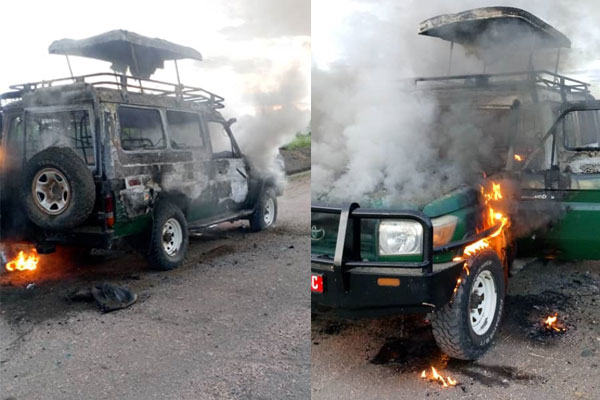Prime
Govt tightens security at Congo border

UPDF and Congolese soldiers plan for ADF attacks in the jungles of DR Congo in 2021. The government yesterday began massing troops at the DRC border to intensify surveillance and stem infiltration by outlaws. PHOTO | FILE
What you need to know:
Uganda has massed troops, intensified surveillance and activated roadblocks in a multi-pronged response to the killings on Monday of foreign tourists and their Ugandan chauffeur inside Queen Elizabeth National Park by suspected ADF
The government yesterday began massing troops at the border with the Democratic Republic of Congo (DRC), straddling western Uganda, and intensified surveillance to stem infiltration by outlaws.
Checkpoints have been activated on roads in Kasese, two days after suspected members of the Allied Democratic Forces (ADF), a designated terrorist group, killed a British couple and their Ugandan driver-cum-tour guide in the district.
Those who perished in the attack while on a wild safari inside Queen Elizabeth National Park included newlyweds David Jim Barlow, 50, and Emmaretia Celia Geyer, 51.
Their 40-year-old chauffeur Eric Alyai, who was a resident of Entebbe peninsula, was also shot dead.
Bodies of the trio has since been transported to Kampala for embalming and onward handling as security and intelligence agencies, political and civic leaders and tourism stakeholders grapple with a response.

A combination of handout photos showing a burning tour vehicle in which the victims were travelling before the attack by suspected ADF rebels on October 17, 2023. PHOTO/ COURTESY
President Museveni set the cue on Wednesday, decreeing that the “cowardly terrorists” will pay for the “most unfortunate and infuriating” attacks with “their wretched lives”.
In Kampala, the UPDF and Defence Spokesman, Brig Felix Kulayigye, said available intelligence shows the attackers have not crossed back into DRC where they are believed to have strayed from.
The ADF was originally a Ugandan rebel group, but the military pounded them out of western part of the country, forcing them to flee and seek new lairs in Congo’s North and South Kivu provinces from whether they have infiltrated to stage attacks.
The most deadly was in June, this year, when the suspected fighters of the band killed 44 students and residents during a raid on Lhubiriha Secondary School in Kasese.
At the time, as now, Gen Museveni said the onslaughts were a distraction by ADF due to pressure of the joint counter-offensive against them by Ugandan and Congolese armies since November 2021.
According to the UPDF, the aerial and ground assaults on the outlaws have degraded their strategic and operational capabilities, which is why its fighters are marauding in smaller, difficult-to-detect groups.
Possible mission
Highly-placed sources briefed on the situation told this newspaper that they believed the attacks were calculated to force UPDF to withdraw some of its troops at the frontline in DR Congo to buttress its borders, which would be counter-productive.
As a result, according to the official, more soldiers have been deployed from other divisions to bolster the Mountain Brigade, Uganda’s arrow head in the counter-offensive against ADF and other subversive elements, following the Monday incident.
The attack targeting foreign tourists made global headlines and shook the tourism sector recovering from Covid-era shutdown of the skies and, from May, reported booking cancellations following the enactment of the Anti-Homosexuality Act.
Uganda grossed $1.6b from tourism by 2019, and stakeholders have been working round-the-clock to better prospects after three years of disruptions, explaining why officials vowed the assailants in the Monday attack will not survive.

David Jim Barlow and Emmaretia Cecilia Geyer. PHOTO/COMBO
High-level officials from multiple agencies have held back-to-back crises meetings in Kampala, the capital, and in western Fort Portal City where the UPDF Mountain Division is headquartered, resolving to deploy senior spymasters and commanders oversee the safeguarding operations in person.
Similar meetings have also taken place in Kasese District, long a target for ADF, with a top official yesterday announcing a stop to night movements for residents for their safety.
Deputy Resident District Commissioner (D/RDC) Maate Magwara, a retired army Lieutenant, warned that operatives under the reinforced security arrest anyone out of their homes by 7:30pm a suspect.
“The government is committed to ensuring the safety of the people and for that matter, more Uganda People’s Defence Forces soldiers will be deployed along the border line,” he said, adding, “I encourage the people, especially those in Kasese which is the most affected district, to desist from moving at night and should be at their homes at least by 7:30pm”.
Any individual found “loitering outside in the night hours would be held a suspect,” said Lt Magwara, the number-two point man on security in the district.
It was unclear if the planned movement restriction was decided on by the District Security Committee, comprising the army, police, intelligence and selected political/civic leaders, or an individual proposal by the deputy RDC.
President Museveni rubbished a similar idea broached in June by one of his appointees following the June attack on Lhubiriha SS, saying Ugandans should be free-handed to enjoy both day and night-time life.
Texus Bwambale, a resident of Kaghema village in Kyarumba Sub County, however, welcomed the limitations if they can guarantee safety of locals and visitors.
“Like during the Covid-19 pandemic, we were restricted to doing our business up to a certain time, especially not beyond 6pm. So, if this is also applied in this period, I think it can work,” he said.
The massing of troops at the border, Brig Kulayigye said, was informed by intelligence and aims to achieve three things: securing the country, safeguarding populations and hunting down the assailants.
Collaboration
Officials yesterday made a clarion call for anyone with information on the whereabouts of the Monday attackers, or movement of ADF, to share it in confidence with security forces or elected leaders amid suspicions, according to Lt Magwara, of local collaborators.
“We suspect that these suspected ADF remnants have collaborators within us (the community),” he said, “… because these regular attacks cannot happen without any connection with someone, who is conversant with the area.”
The Deputy RDC declared “nor mercy” for any accomplice caught, adding that whereas the security forces cannot deploy inch-by-inch to secure the border, there is adequate manpower on the ground to nip any threat in the bud.
Similarly, Kisoro District Deputy RDC, Mr Robert Tukamuhebwa, said they have instituted sentries at Kanaba Gap, next to Echuya Forest Reserve, with travelers subject to identification check.
This, he said, will prevent bad elements from slipping through the security net to cause mayhem at high-value Bwindi and Mgahinga national parks.
“We have made strategic and tactical [interventions] on different roads heading to the tourist destination in Bwindi and Mgahinga national parks,” he said, “Local leaders and the general public have been alerted to be vigilant by reporting suspected criminals to the security personnel in their respective areas.”
Reported by Alex Ashaba, Moureen Biira & Robert Muhereza




